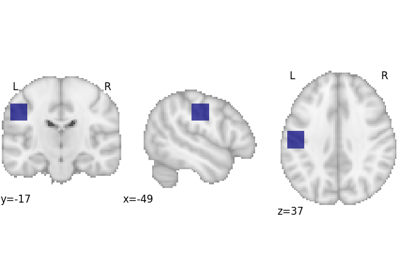nimare.decode.discrete.ROIAssociationDecoder
- class ROIAssociationDecoder(masker, kernel_transformer=<class 'nimare.meta.kernel.MKDAKernel'>, feature_group=None, features=None, **kwargs)[source]
Bases:
nimare.base.DecoderPerform discrete functional decoding according to Neurosynth’s ROI association method.
- Parameters
masker (
nilearn.input_data.NiftiMasker, img_like, or similar) – Masker for region of interest.kernel_transformer (
nimare.meta.kernel.KernelTransformer, optional) – Kernel with which to create modeled activation maps. Default is MKDAKernel.feature_group (
str, optional) – Feature group name used to select labels from a specific source. Feature groups are stored as prefixes to feature name columns in Dataset.annotations, with the format[source]_[valuetype]__. Input may or may not include the trailing underscore. Default is None, which uses all feature groups available.features (
list, optional) – List of features in dataset annotations to use for decoding. If feature_group is provided, then features should not include the feature group prefix. If feature_group is not provided, then features should include the prefix. Default is None, which uses all features available.
Notes
The general approach in this method is: 1. Define ROI. 2. Generate MA maps for all studies in Dataset. 3. Average MA values within ROI to get study-wise MA regressor. 4. Correlate MA regressor with study-wise annotation values (e.g., tf-idf values).
References
Yarkoni, Tal, et al. “Large-scale automated synthesis of human functional neuroimaging data.” Nature methods 8.8 (2011): 665. https://doi.org/10.1038/nmeth.1635
- fit(dataset, drop_invalid=True)[source]
Fit Decoder to Dataset.
- Parameters
dataset (
nimare.dataset.Dataset) – Dataset object to analyze.drop_invalid (
bool, optional) – Whether to automatically ignore any studies without the required data or not. Default is True.
- Returns
nimare.results.MetaResult– Results of Decoder fitting.
Notes
The
fitmethod is a light wrapper that runs input validation and preprocessing before fitting the actual model. Decoders’ individual “fitting” methods are implemented as_fit, although users should callfit.Selection of features based on requested features and feature group is performed in
Decoder._preprocess_input.
- set_params(**params)[source]
Set the parameters of this estimator.
The method works on simple estimators as well as on nested objects (such as pipelines). The latter have parameters of the form
<component>__<parameter>so that it’s possible to update each component of a nested object.- Returns
self
- transform()[source]
Apply the decoding method to a Dataset.
- Returns
results (
pandas.DataFrame) – Table with each label and the following values associated with each label: ‘r’.
